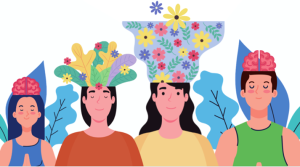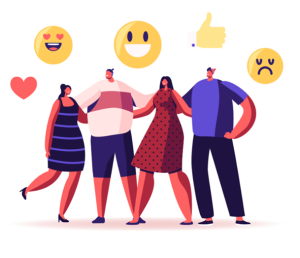TEDS MSc placement students Xinyi and Ziyu reflect on the focus groups the team held, looking at experiences unique to the millennial generation.
The New Generation – Millennials
Millennials, born between 1981-1996, comprise the largest generation in the U.K. (Statista, 2023). They are facing difficulties that are specific to this generation. Compared with earlier generations, this generation is more likely to have considerable student debt, be unemployed, and have low wealth and personal income (Pew Research Center, 2014). Millennials are also considered “digital natives” who grow up in the presence of digital technology, with 81% of them on Facebook (Pew Research Center, 2014). These increasing financial concerns, employment pressures, and access to more technology and information could be negatively impacting this generation’s mental health and well-being. There is a significant concern for the rising trend of mental health problems in millennials, with recent research showing a substantial increase in both generalised anxiety and depression (Slee et al., 2021).
Exploring this generation’s perspectives on mental health and well-being is a helpful way to gain valuable insight. As part of our placement with the EDIT Lab, we organised focus groups with twins from the Twins Early Development Study (TEDS) to discuss their experiences of mental health. Born between 1994-1996, TEDS twins are millennials and can offer insight into the unique experiences of this generation. When we asked some of these participants about influences on their mental health and three main themes emerged:
1. The impact of social media
2. Face-to-face social relationships
3. Increasing awareness of mental health
The Impact of Social Media
The topic of social media use was brought up a lot during the focus group, potentially due to the increased social media use since the pandemic (Statista, 2023) that plays a significant role in our well-being. Participants reported both positive and negative impacts of social media use, identifying the stress of being constantly available as a negative side of social media use. As they indicated: “People now experience guilt if they have not spoken to someone in a month.”
Participants also discussed the positive side of social media and reported that it helps them keep in touch with friends and forms a bond in supportive online communities. As they said, “Sharing daily life (with friends) could be rewarding.” Some participants also suggested social media use could be beneficial to people in rural communities to build connections when the socialising opportunities are limited.
Face-to-Face Social Relationships
Focus groups reported it being more challenging to maintain social relationships post-COVID. Although there has been a steady increase in virtual interactions since the pandemic (Sahi et al., 2021), participants emphasised the importance of face-to-face relationships and perceived them as absorbing and engaging. They preferred a “genuine human connection” since it could increase well-being and create a sense of safety. This is supported by empirical research that found individuals involved in face-to-face relational contexts indicated having lower depressive symptoms and higher life satisfaction compared with individuals involved in technology-based passive relational contexts (Simone et al., 2019).
Notably, some participants discussed the value of family/sibling connections and the ability to talk openly to their twin. They said, “Maybe being a twin means that we are used to having someone around, and so feel lost without in-person contact.” Family and sibling relationships provide an understanding of one’s own emotions and humour. Indeed, research has found that better family relationships are related to reduced psychological distress, more life satisfaction, stronger resilience, a sense of coherence, self-compassion, optimism, self-efficacy, and self-esteem (Grevenstein et al., 2019).
Increasing Awareness of Mental Health
Participants reported that ‘toxic productivity’ is prevalent in their generations. As they indicated: “This generation has lost the ability to do nothing or do something simply for the fun of it.” They also discussed having to learn self-care to support their wellbeing because of this tendency to want to be productive all the time.
Some participants indicated that they feel the added awareness of mental health difficulties has made more help available. As they indicated: “ADHD, for example, seems to be diagnosed more frequently to the benefit of those receiving a diagnosis.” Indeed, recent research has also suggested that raising mental health awareness increased help-seeking behaviours (Van Den Broek et al., 2023).
Participants also reported talking about mental health much more and that this reduced stigma has led to positive changes in many aspects of life. For example, one of them reflected “There is more understanding in the workplace for people with mental health issues.” In short, the increasing online interactions both positively and negatively impact this generation’s well-being. Meanwhile, they still recognise face-to-face social relationships play a unique and critical role in their lives. The rising mental health awareness in this generation seems to have increased engagement with self-care behaviours. Exploring their perceptions and experience with mental health in the face of the rapid change within society gave us a unique insight and shed light on future mental health research.
In short, the increasing online interactions both positively and negatively impact this generation’s well-being. Meanwhile, they still recognise face-to-face social relationships play a unique and critical role in their lives. The rising mental health awareness in this generation seems to have increased engagement with self-care behaviours. Exploring their perceptions and experience with mental health in the face of the rapid change within society gave us a unique insight and shed light on future mental health research.
We want to end this blog by thanking the twins who volunteered their time to share their personal experiences and exchange many valuable perspectives about mental health and well-being with us! We want to express our gratitude to each of you for your active participation and insightful contributions.
Stay tuned for our next blog post!
Read more below (references):
Grevenstein, D., Bluemke, M., Schweitzer, J., & Aguilar-Raab, C. (2019). Better family relationships—Higher well-being: The connection between relationship quality and health related resources. Mental Health and Prevention, 14, Article 200160. https://doi.org/10.1016/j.mph.2019.200160
Pew Research Center. (2019, January 17). Where Millennials end and Generation Z begins. Retrieved from https://www.pewresearch.org/short-reads/2019/01/17/where-millennials-end-and-generation-z-begins/
Pew Research Center. (2014, March 7). Millennials in adulthood. Retrieved from https://www.pewresearch.org/social-trends/2014/03/07/millennials-in-adulthood/#:~:text=Millennials%20are%20also%20the%20first,stage%20of%20their%20life%20cycles
Sahi, R. S., Schwyck, M. E., Parkinson, C., & Eisenberger, N. I. (2021). Having more virtual interaction partners during COVID-19 physical distancing measures may benefit mental health. Scientific Reports, 11(1). https://doi.org/10.1038/s41598-021-97421-1
Slee, A., Nazareth, I., Freemantle, N., & Horsfall, L. (2021). Trends in generalised anxiety disorders and symptoms in primary care: UK population-based cohort study. The British journal of psychiatry : the journal of mental science, 218(3), 158–164. https://doi.org/10.1192/bjp.2020.159
Simone, M., Geiser, C., & Lockhart, G. (2019). The importance of face-to-face contact and reciprocal relationships and their associations with depressive symptoms and life satisfaction. Quality of Life Research, 28(11), 2909–2917. https://doi.org/10.1007/s11136-019-02232-7
Statista. (2023, December 20). Millennials in the UK. Retrieved from https://www.statista.com/topics/11102/millennials-in-the-uk/#topicOverview
Statista. (2023, December 18). Social media use during coronavirus (COVID-19) worldwide. Retrieved from https://www.statista.com/topics/7863/social-media-use-during-coronavirus-covid-19-worldwide/#topicOverview
Van Den Broek, M., Gandhi, Y., Sureshkumar, D. S., Prina, M., Bhatia, U., Patel, V., Singla, D. R., Velleman, R., Weiss, H. A., Garg, A., Sequeira, M., Pusdekar, V., Jordans, M. J. D., & Nadkarni, A. (2023). Interventions to increase help-seeking for mental health care in low- and middle-income countries: A systematic review. PLOS Global Public Health, 3(9), e0002302. https://doi.org/10.1371/journal.pgph.0002302


